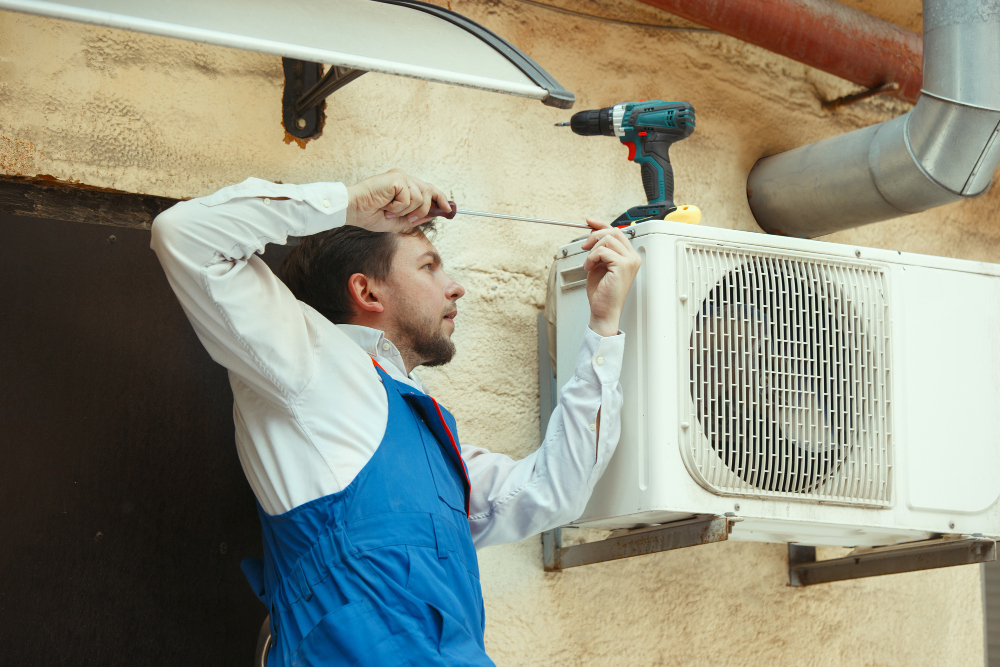Is your air conditioner not performing like it used to? Ignoring potential problems with your air conditioning unit can lead to bigger issues down the line. At Vital Air Conditioning, we understand the importance of a cool and comfortable environment, especially in Sydney’s heat. In this blog, we’ll discuss the signs that your air conditioner needs repair, how long you can expect your AC unit to last, and the essential steps to diagnose a malfunctioning system. Remember, for any repair work, always rely on an electrician with the right qualifications to ensure a job well done.
Symptoms of a Bad Air Conditioner
Your air conditioning system has its own way of communicating, and recognizing its signals can prevent minor issues from escalating into major problems. Here is a comprehensive list of symptoms of a bad air conditioner.
Spitting
First and foremost, if your air conditioner is spitting warm air when you have the temperature set low, it’s not a good sign. Potential culprits include a refrigerant leak, compressor malfunction, or an inaccurate thermostat. Another bad sign is feeble or low air flow coming out of your air conditioner. When the air isn’t flowing as vigorously as it should, it could point to an obstructed airflow due to a clogged filter, blocked ducts, or a weakened motor struggling to push air through the system.
Clattering Sounds & Strange Odors
Clattering and odours can also be signs of a bad air conditioning unit. Unfamiliar sounds like grinding, squealing, or rattling noises aren’t normal for a well-functioning air conditioner. These could be signs of loose components, a damaged fan, or a worn-out belt, all of which require attention. In a similar fashion, foul odours emanating from your AC unit could be indicative of mould or bacterial growth within the system or ducts. These odours not only compromise comfort but can also affect indoor air quality.
Other things to watch out for include frequent cycling, excessive humidity, and leakage. If your air conditioner cycles on and off rapidly, it might be grappling with issues like a faulty thermostat, an improperly sized unit, or electrical irregularities. This not only impacts efficiency but can also strain the system. Conversely, beyond cooling, air conditioners also play a role in dehumidifying indoor air. If your home feels excessively humid, it might be due to a malfunction in this dehumidification process within the AC unit. Finally, puddles or moisture around your air conditioner are problematic. Water leaks could indicate a clogged drain, while refrigerant leaks are more serious and can pose health risks. These are all signs of a bad air conditioning unit.
Why Prompt Action Matters
Ignoring these symptoms can lead to larger issues, more expensive repairs, and even premature system replacement. Timely action not only saves you money but also ensures your comfort isn’t compromised during sweltering summer days. If you notice any of these symptoms, it’s recommended to contact professionals like Vital Air Conditioning Services for a comprehensive inspection and repair. Attempting to fix these problems on your own could worsen the situation or result in personal injury.
Lengthening Your Air Conditioner’s Lifespan
An air conditioner represents a significant investment, and ensuring its longevity is crucial for your comfort and budget. Understanding the various factors affecting your air conditioner’s lifespan helps you make informed decisions to keep it running optimally. These factors include the quality of construction, usage patterns, maintenance practices, and environmental factors.
Quality of Construction
High-quality air conditioners, typically found in reputable brands, are constructed with top-notch components that contribute to their longevity. Investing in a well-constructed unit from the start can pay off over the years.
Usage Patterns
How frequently you use your air conditioner plays a significant role. Units operating almost continuously during peak seasons might experience more wear and tear compared to those used moderately.
Maintenance Practices
Routine maintenance is the cornerstone of extending your air conditioner’s life. Neglecting essential tasks like changing air filters, cleaning coils, and ensuring proper airflow can lead to premature breakdowns.
Environmental Factors
The climate in your area, exposure to outdoor elements, and humidity levels can impact your unit’s lifespan. For instance, units in coastal regions may face increased corrosion due to salt in the air.
Strategies to Prolong Lifespan
By adopting proactive measures and enlisting professional help, you can significantly extend your air conditioner’s lifespan. A few things that you can do to look after your air conditioning unit include:
Regular Maintenance
Routine maintenance, including caring for your air filter, cleaning your air conditioner’s coil, ensuring adequate ventilation for the unit, and periodically checking your thermostat settings, is crucial. Routinely changing or cleaning air filters is crucial. Clean filters allow proper airflow, preventing your system from working harder than necessary. Dust and debris accumulation on coils can hamper efficiency. Regular cleaning ensures optimal performance and energy efficiency. Keeping the area around your outdoor unit clear of debris, vegetation, and obstacles enhances airflow, reducing strain on the system. Efficient thermostat usage can decrease unnecessary stress on your air conditioner. Using programmable thermostats to adjust settings when you’re away can lead to substantial energy savings.
Engaging Professionals for Maintenance and Repairs
Bringing a professional onto the scene is essential for a few reasons. Qualified technicians possess the expertise to accurately diagnose issues and implement the right solutions, enhancing your unit’s performance and lifespan. Incorrect diagnosis or DIY attempts can exacerbate problems, leading to more costly repairs. Professionals can prevent this by addressing issues correctly the first time. Air conditioning systems involve electrical components and refrigerants. Handling repairs without proper knowledge or equipment can pose safety risks. Professionals ensure safe and secure repairs. Professional technicians can address problems promptly, ensuring your air conditioner operates efficiently. This not only reduces energy consumption but also extends the system’s life.
How to Diagnose a Broken Air Conditioner
If in a pinch or if you’re wanting to isolate an issue for your air con mechanic & inform him before he comes out.
Begin by ensuring that your air conditioner is properly connected to the power source. Confirm that circuit breakers haven’t tripped, cutting off electricity to the unit. Then double-check the thermostat settings. Ensure that it’s set to the desired temperature and cooling mode. Sometimes, inaccurate thermostat settings can lead to perceived cooling issues.
Regularly inspect and clean or replace air filters. Clogged filters restrict airflow, reducing your air conditioner’s efficiency and cooling capabilities. After that Take a look at the outdoor unit. Remove any debris, leaves, or vegetation that might obstruct the unit’s airflow. Proper airflow is crucial for efficient cooling. Turn on your air conditioner and listen for any unusual sounds. Banging, grinding, or squealing noises can indicate mechanical issues that require attention. Then pay attention to how quickly your air conditioner cools the room. If it’s taking longer than usual or struggling to reach the desired temperature, there might be an underlying problem.
Finally, Inspect the area around your air conditioner for any signs of water leakage. Leaks could indicate a clogged drain or a refrigerant issue that needs immediate attention. If you notice any unusual odours coming from your air conditioner, it could indicate mould or bacterial growth, often because of the water leaking. These issues not only affect comfort but also indoor air quality. Notice how often your air conditioner cycles on and off. Frequent cycling might point to a malfunctioning thermostat or other electrical problems.
When to Seek Professional Help
While the above steps can help you identify minor issues, certain problems require professional expertise:
Refrigerant Leaks
Handling refrigerants requires specialized training and equipment due to their environmental impact and potential health hazards.
Electrical Problems
If you suspect electrical issues or encounter problems with circuit breakers, it’s best to let a qualified electrician handle the repairs.
Compressor or Motor Issues
Repairs involving the compressor or motor components are complex and should be left to professionals.
Complex Repairs
If you’re unable to identify the root cause of the problem, or if the issue persists despite your efforts, it’s time to call in the experts.
Remember that diagnosing and repairing air conditioning systems can be intricate. If you’re unsure about any step or encounter a problem beyond your expertise, don’t hesitate to contact a qualified technician from Vital Air Conditioning Services.
Don’t let a malfunctioning air conditioner disrupt your comfort. Vital Air Conditioning Services specializes in Sydney air conditioning repair and offers reliable repair and maintenance solutions to keep your AC running smoothly year-round. Whether you need routine maintenance or urgent repairs, our experienced technicians are here to help.
Paying attention to the symptoms of a bad air conditioner, understanding its typical lifespan, and knowing how to diagnose common issues are crucial for maintaining a comfortable indoor environment. Remember, when in doubt, always consult professionals like Vital Air Conditioning Services to ensure your air conditioner receives the care it deserves.







